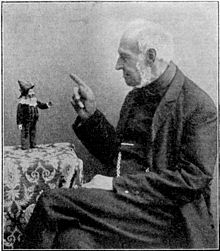Josef Leonhard Schmid
Josef Leonhard Schmid (born January 29, 1822 in Amberg , † December 31, 1912 in Munich ) was a German puppeteer and theater director.
Life

Josef Schmid began training as a bookbinder in Amberg at the age of 12 and completed it in 1837. But because of a lung disease, he was unable to do the job. After recovering from his illness, he went hiking and came to Munich. At first he worked there as a day laborer. By his retirement in 1887, he had worked as an insurance clerk. To improve the family livelihood, he was active in his spare time by performing nativity scenes and puppet games in his apartment.
Inspired by the example of a cousin in Amberg, who ran a marionette theater as a sideline, Schmid applied to the Munich School Commission on September 10, 1858 for permission to open a puppet theater for children to play in public. This distinction between adult and child audiences, almost unknown for the theater at the time, aroused the suspicion of the authorities; The matter was referred to the police department, most recently to the State Ministry of the Interior, because the child's claim to social equality, which Schmid had apparently postulated, was suspected of political motives and the resurgence of cross-class trouble spots.
It was only through the mediation of the court official Franz von Pocci (1807–76) on November 15, 1858, that Schmid received permission to play a Munich marionette theater , which was not restricted to children, but was open to everyone Rosenrot and Princess Lilienweiss or Die enchanted Lily “was opened. After Pocci's death, Schmid, as the sole rights holder, owned 53 Punch and Judy comedies, knight plays, fairy tale games, prologues and interludes written for the “Munich Marionette Theater”. Plays from other authors enriched the game plan, which was not closed to trivial subjects. Schmid certainly appreciated his author, but in the end, as “Papa Schmid”, he remained caught up in a naive understanding of art characterized by religion and petty-bourgeois morality.
Schmid brought the entire historical spectrum of forms of representation of traditional puppetry such as hand puppet and shadow theater, variety and transformation figures, Theatrum mundi and mechanical theater as well as projection arts to use; his theater was so successful that the original venue on Prannergasse was soon abandoned in favor of a larger venue. Schmid, who spoke Kasperl himself almost to the end, was able to win over numerous Munich artists, among them Simon Quaglio and the court theater painter Johann Mettenleiter; the orientation towards the miniaturized imitation of historical-realistic furnishings, however, already appeared artistically museum-like at the time of his death.
With the performance of Pocci's Punch and Judy comedies, which gave the “Funny Figure” an ironic-fantastic and, for all time-bound perspective, universal-humane character, the “Munich Marionette Theater”, however, fulfilled a catalytic function: the next generation of puppeteers, Schmid's aesthetic approach to play overcame, was able to build on a solid literary tradition that has now become part of the classical repertoire. In 1900 the city of Munich built a permanent house for the theater designed by the architect Theodor Fischer , which is still used today.
In 1911, a year before his death, Papa Schmid arranged the succession for his house. After the city rejected his offer to buy the inventory for 20,000 marks, he appointed his daughter Babette Klinger-Schmid (1859–1930) as heir. Babette Klinger-Schmid continued to run the theater in the style of her father for over 20 years, albeit with less success.
tomb
The grave of Josef Schmid, his wife and daughter is located in the Old Southern Cemetery in Munich (Gräberfeld 33, Row 3, Platz 15, location ).
Honors
In his hometown of Amberg, Josef-Schmid-Straße and in Munich Papa-Schmid-Straße are named in his honor. A bronze medallion with a bust, made in 1900 by Theodor Fischer , is attached to the Munich puppet theater at Blumenstrasse 32 .
literature
- Volker D. Laturell : Theater and youth in Munich: a compilation of 500 years of Munich theater history. Tins, Munich 1970, p. 47.
- Manfred Wegner: Schmid, Joseph Leonhard. In: New German Biography (NDB). Volume 23, Duncker & Humblot, Berlin 2007, ISBN 978-3-428-11204-3 , p. 150 f. ( Digitized version ).
Web links
Individual evidence
| personal data | |
|---|---|
| SURNAME | Schmid, Josef Leonhard |
| ALTERNATIVE NAMES | Papa Schmid (nickname) |
| BRIEF DESCRIPTION | German puppeteer, founder of the Munich Marionette Theater |
| DATE OF BIRTH | January 29, 1822 |
| PLACE OF BIRTH | On the mountain |
| DATE OF DEATH | December 31, 1912 |
| Place of death | Munich |


